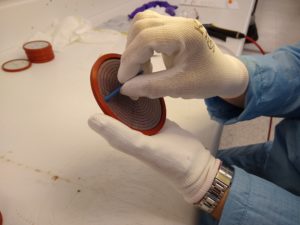Did you not get the results you expected, or face setbacks during your exams? You’re not alone, and there is no reason you can’t still be an engineer!
Hi, my name is Lorcan Smith and I’m an apprentice engineer. I work for a semiconductor company in Lincoln – Dynex Semiconductor Ltd. The company has a rich history in the design, development and production of high-power Semiconductors and Power Assemblies. The Company’s products provide maximised efficiency and reliability in severe environments, whilst contributing to the reduction of our planets carbon footprint.
We make all sorts of devices from individual components (like diodes or thyristors) to big power assemblies.
![]() Throughout the years, our products have been used in international projects covering in everything from trains to renewable energy production, and even F1 cars.
Throughout the years, our products have been used in international projects covering in everything from trains to renewable energy production, and even F1 cars.
Why did you choose a STEM-related career?
I’ve been interested in STEM for as long as I can remember, especially engineering. I always loved building Snap Circuits to see the different things electricity could allow us to do. I was always interested in how things worked – many relatives are engineers, and I loved to hear about their jobs. When I was at school, my favourite subjects were physics and maths. My passion for the subject only increased at school, especially after taking a work experience placement at Rolls-Royce.
My biggest achievements have been overcoming some significant setbacks, which also posed great challenges. I was unable to finish my A-levels and left school with AS results only at 17. After finding an apprenticeship which was right for me, I was involved in a serious motorbike accident. Despite all this, I have managed to persevere and will be a time-served apprentice, with experience in quite a niche industry.
What does your current job involve?
My current job has been all about learning from more experienced engineers. I am nearly qualified now, which means I have taken on more responsibility for ensuring the smooth running of the production line. When things go wrong, it is our job to find out why, and if we can ‘save’ the basic units. A big part of my role is to make it so that as many units as possible get to test, and pass everything.
 Photo: Inspecting a basic unit
Photo: Inspecting a basic unit
What is the most exciting thing you have done at Dynex Semiconductor?
I loved working on some investigations using a Fisnar robot – I was left to program a route which dispensed a liquid rubber around a basic unit. This is an exciting, ongoing project which would massively improve the efficiency of our production.
How does your work impact the world around us?
The products we make are used in a wide range of industries – including the renewable energy sector. Our company are contributing to the increased energy demand by producing highly reliable electric components. Our devices control current flow into renewable sources and electric applications, increasing energy mass, affordability and reducing carbon footprint.
Do you wish you had gone to university?
I have no regrets! At the time, I was devastated that I was unable to go to university, which I had always thought was the only real option for a successful career. I am now in a position where I’ve got 3 years of industry experience when most people are only looking for their first job.
I’ve grown in confidence from my time learning practical workplace skills, and cementing some of the ‘soft skills’ I had from school. Skills like teamwork (collaboration), communicating with colleagues and customers, and problem-solving are vital to the workplace. I’ve had the opportunity to work on many exciting customer projects, new product designs, and contributed to increasing product yield and performance.
What if you change your mind and want a degree?
There are plenty of opportunities to get a degree later in life, or even as part of an apprenticeship. If you want to do a degree but also learn on-the-job, higher apprenticeships allow you to gain valuable work experience whilst studying for a degree part-time.
Can you get professionally recognised without a degree?
Absolutely! If you want the benefits of being professionally registered – where the engineering council recognises your competency and ability – but don’t have a degree, there are options open to you. The first is to become accredited as EngTech, which only asks for a level 3 qualification and relevant experience. For Incorporated Engineer (IEng) and Chartered Engineer (CEng), there are pathways open to prove how industry experience has allowed you to demonstrate your knowledge, with no degree required.
How can I become an apprentice?
If you’re interested in becoming an apprentice, the first thing to do is to talk to a career advisor at school or college. You can also use the government’s ‘Find an Apprenticeship’ website, and many job-hunting tools allow you to filter by apprenticeships. My final piece of advice is to reach out to companies directly, and see if they run a scheme and when you could apply.
Do you have any top tips for young people looking to work in a role like yours?
My biggest tip is not to think you must go to university to become an engineer, most of the people at my company (including the CEO!) started as apprentices. Apprenticeships provide the perfect balance between practical work experience and part-time study, at any level relevant to you.
My next big tip is to work on your skill sets, employers really do look for key skills in their employees, the ones I use most are communication and collaboration, personal motivation, dedication, problem-solving, and staying positive. I thoroughly recommend you find ways to improve your skills and use them whenever you can!
If you are looking to get started in an engineering or STEM career straight away, without going to university it can be done! There are lots of good resources out there, including the government website or even LinkedIn to do a job search. Don’t be afraid of contacting local companies to see what they are offering.
Download PDF
If you wish to save, or print, this article please use this pdf version »


